Industrial Parks in Dubai: Economic Opportunities and Growth
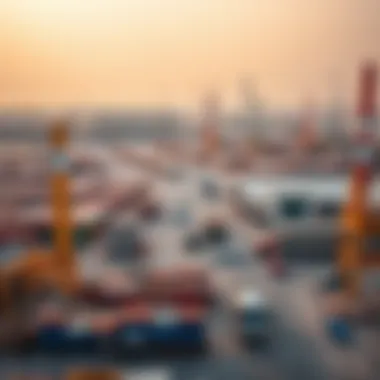
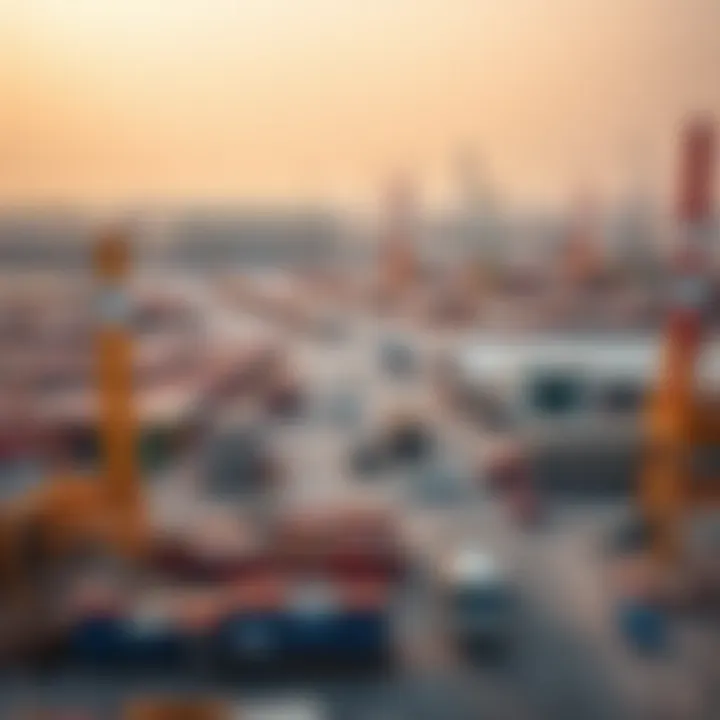
Intro
Dubai has emerged as a vibrant hub for commerce and innovation, playing a critical role in the economic expansion of the Middle East. At the center of this growth, industrial parks provide the necessary infrastructure and support for a variety of businesses. They represent a strategic asset within Dubai’s ambitious plan for economic diversification, making them essential for both local entrepreneurs and international investors looking to capitalize on the city’s dynamic marketplace.
Industrial parks in Dubai are not just an afterthought; they are strategically designed environments that foster growth and efficiency. They house a multitude of industries ranging from manufacturing and logistics to technology and pharmaceuticals. Each industrial park brings with it tailored resources, reduced operational costs, and logistical advantages that can significantly bolster a company’s potential.
This article aims to explore captivating details about the industrial parks in Dubai — highlighting their significance in the economic landscape, understanding the different industries they serve, and the evolving governmental policies shaping their growth. Whether you are an investor seeking opportunities or a stakeholder aiming to understand the nuances of the industrial sector, this comprehensive guide endeavors to provide insightful perspectives and actionable information.
As we embark on this journey, readers will gain insights on current market trends, investment strategies, and the future of industrial parks in Dubai. By analyzing these aspects closely, we can appreciate just how vital these spaces are to the region’s economic tapestry.
Understanding Industrial Parks
In the bustling metropolis of Dubai, industrial parks play a pivotal role, acting as a foundation for the region's vibrant economy. They are not merely clusters of factories or warehouses, but strategic ecosystems designed to foster growth, innovation, and collaboration among various industries. With a suitable framework that promotes investment, the understanding of these industrial parks is essential for anyone looking to navigate Dubai's intricate commercial landscape.
Definition and Purpose
At their core, industrial parks are specially designated zones where businesses can set up operations and benefit from shared resources. These are spaces where manufacturing, logistics, and technology converge, creating a symbiotic relationship between different sectors. The fundamental purpose of these parks is to facilitate industrial activity by providing the necessary infrastructure and services that businesses require to thrive. They minimize operational costs, offer efficient access to supply chains, and often ensure compliance with local regulations.
For example, Dubai Industrial City aims to cater to the manufacturing and logistics sectors by providing world-class facilities and services. The design of these parks often takes into consideration the integration of transportation networks and utilities, ensuring that businesses can operate smoothly while maximizing productivity.
Economic Importance
The significance of industrial parks in the UAE’s economy cannot be overstated. They contribute immensely to job creation, attract foreign investments, and stimulate local enterprises. As more companies set up camp within these designated areas, the benefits spill over into the community, creating a ripple effect that fosters growth and stability across various economic sectors.
Here are some key reasons why industrial parks are critical to the economy:
- Investment Attraction: They attract local and foreign investors by providing a conducive environment to do business.
- Job Creation: With numerous companies operating within their bounds, industrial parks generate a plethora of employment opportunities.
- Innovation Stimulus: By grouping similar industries together, these parks encourage knowledge sharing and collaboration, allowing for technological advancements.
"The establishment of industrial parks in Dubai has transformed the local economy, creating robust pathways for investment and growth."
Historical Context
The evolution of industrial parks in Dubai is a testament to the city's visionary leadership and strategic planning. Initially, as Dubai was primarily known for its trade and tourism, the need for an industrial base became apparent in the late 20th century. In the 1990s, the government began emphasizing the diversification of its economy, leading to the development of dedicated zones for industrial activities.
Over the years, the ambition of these initiatives has matured, resulting in the establishment of multiple industrial parks, each designed to cater to different sectors of the economy. The Jebel Ali Free Zone, for example, was one of the first initiatives aimed at creating an economic hub that embraced global trade. Today, it remains one of the largest free zones on the planet, showcasing the evolution and expansion of industrial parks in Dubai.
As we navigate through this exploration of industrial parks in Dubai, understanding their definition, economic impact, and historical context lays a solid groundwork for further examining the various parks and their contributions to the region's growth.
Major Industrial Parks in Dubai
Dubai, known for its dazzling skyline and luxurious shopping, is also home to a series of industrial parks that play a crucial role in the city's economic framework. These parks serve as ecosystems where businesses can thrive, innovate, and contribute to the region's growth. Each park is designed to cater to specific industries, making them not just places of work but vibrant communities of commerce.
The importance of understanding these industrial parks lies in the opportunities they present for investors and entrepreneurs alike. With the right infrastructure, logistics, and government support, businesses can leverage unique advantages that these parks provide, such as proximity to transportation hubs and access to a skilled labor force. Moreover, the rapidly evolving dynamics of the global economy often finds these parks at the forefront of new technological advancements and sustainable practices.
Dubai Industrial City
Dubai Industrial City stands as a beacon of industrial development in the emirate. Spanning approximately 560 million square feet, this industrial park is specially tailored for manufacturers, logistics providers, and other businesses looking for an environment conducive to growth. Its strategic location adjacent to the Al Maktoum International Airport and near the Jebel Ali Port provides businesses with essential logistical advantages.
One of the crown jewels of Dubai Industrial City is its emphasis on sustainability. The park is designed with environmental considerations in mind, encouraging green building practices and waste management solutions. Additionally, businesses operating here benefit from the extensive support offered by the Dubai government, including streamlined licensing processes and financial incentives.
"The best part about Dubai Industrial City is the collaborative spirit. You can find everything from small workshops to large multinational corporations all coexisting and thriving."
Jebel Ali Free Zone
As one of the oldest and most significant industrial areas in Dubai, the Jebel Ali Free Zone has garnered a reputation for excellence in trade and logistics. Covering 48 square kilometers, this park is a vital hub for over 7,000 multinational companies and a crucial facilitator for foreign direct investment. The advantages of being located at this free zone are compelling, as it offers 100% foreign ownership, zero corporate tax, and full repatriation of profits.
Businesses here can tap into a bustling network of supplier and customer relationships. The accessibility to key shipping routes and nearby ports amplifies trade efficiency, making it an attractive option for companies in logistics, manufacturing, and a myriad of other sectors. Furthermore, the Zone is equipped with cutting-edge technology and innovation hubs that nurture growth and adaptability, crucial in today’s fast-paced market.
Dubai Investment Park
Dubai Investment Park represents a distinctive blend of industrial, commercial, and residential spaces. It offers an integrated environment for businesses across various sectors, including ICT, manufacturing, and tourism. One of the key features of Dubai Investment Park is its focus on mixed-use development, which creates a unique synergy between living and working spaces. This fosters a balanced lifestyle for employees and residents alike.
The park is also notable for its advanced infrastructure, featuring state-of-the-art facilities for utility services and transportation accessibility. Whether it’s the easy access to road networks or the availability of comprehensive utility services, businesses here see the value added to their operations. Additionally, Dubai Investment Park is keen on promoting sustainable practices, encouraging companies to adopt environmentally friendly methods in their operations.
In understanding the makeup of industrial parks in Dubai, investors, developers, and market analysts gain insights into how these parks can sustain growth and foster innovation in a rapidly changing economic landscape.
Infrastructure and Facilities
Assessing the infrastructure and facilities of industrial parks in Dubai gives us a clearer picture of their role in fostering a robust economy. These parks are not just isolated zones for business; they are intricate systems that support various functionalities essential for companies to thrive. Transportation access, utility services, and technology hubs merge to create an ecosystem that ensures efficiency and innovation. The right infrastructure can spell the difference between success and mediocrity in industrial operations, making it a critical factor for investors and stakeholders in the region.
Transportation Access


Transportation access is a backbone of any industrial park. In Dubai, this aspect is crucial, given the city’s strategic location as a global trade hub. Major highways and proximity to Dubai International Airport provide seamless logistics capabilities. The creation of metro lines and dedicated freight corridors ensures that materials and products move swiftly between the parks and other business districts.
Companies benefit from shorter lead times and reduced costs when these transport channels are efficient. For instance, firms situated in the Jebel Ali Free Zone can easily dispatch goods to various overseas markets, proving that transportation access significantly strengthens their operational capacity.
- Key Points about Transportation Access:
- Air Routes: Proximity to the airport facilitates fast shipping.
- Roads: Major roads connect parks to key locations quickly.
- Port Facilities: Access to port services enhances international trade opportunities.
Moreover, public transport around these areas encourages a flexible workforce. Employees can commute from different parts of the city, making it easier to attract the best talent.
Utility Services
A constant and reliable supply of utility services is essential in industrial operations. In Dubai’s industrial parks, utility provisions are favorable and designed to meet the high demands of manufacturers and service providers. Electricity, water, and telecommunications must be readily available, with infrastructure capable of scaling up as businesses grow.
Noteworthy is the government's commitment to sustainable energy solutions. Solar energy initiatives are becoming increasingly popular, attracting firms that prioritize eco-friendly practices. A consistent supply of these services ensures that businesses can maintain productivity without interruptions.
- Benefits of Reliable Utility Services:
- Enhanced Productivity: Minimal downtime from utility failures.
- Cost-efficiency: Competitive pricing for utilities leads to lower operational costs.
- Sustainability Initiatives: Supporting green technologies attracts modern investors.
The pay-off from sustainable utility management becomes apparent when industrial parks see lower overall operating costs and businesses viewing them as preferred locations for their operations.
Technology and Innovation Hubs
In the rapidly evolving industrial landscape, technology and innovation hubs within Dubai’s parks serve as a center stage for advancements. These hubs provide companies with state-of-the-art facilities, encouraging research and development as well as collaboration across various industry sectors.
Companies within these innovation centers benefit from networking opportunities, gaining insights into emerging technologies that can revolutionize their operations. The presence of universities and research institutions further enriches this environment, allowing for knowledge transfer and skills development that enhances the domestic workforce.
"Innovation is the heart of industry. In Dubai, the focus on technology transforms challenges into opportunities for growth."
- Characteristics of Technology Hubs:
- Accelerators: Programs that help start-ups grow quickly.
- Laboratories: Dedicated spaces for R&D activities.
- Networking Events: Forums for sharing ideas and collaboration.
Overall, technology and innovation hubs are essential components of the infrastructure at Dubai's industrial parks, supporting not only existing operations but driving future advancements as well, aligning closely with the city’s ambitions of achieving global leadership in various industries.
The combination of effective transportation networks, reliable utility services, and vibrant tech hubs creates a conducive environment where businesses can flourish and capitalize on local and international opportunities.
Types of Industries Supported
Understanding the types of industries that thrive within the industrial parks of Dubai is crucial for grasping the full picture of the area’s economic ecosystem. These parks serve as catalysts for growth and development in various sectors, offering a fertile ground for the establishment and expansion of different industries. Each type of industry brings its unique advantages and challenges, making the diversity of industrial operations a significant factor to consider for any potential investment. This exploration into manufacturing, logistics, and information technology reveals just how tailored the industrial parks are to meet the needs of modern businesses.
Manufacturing and Production
The manufacturing sector in Dubai’s industrial parks is rich and diverse, spanning everything from textiles to electronics. These parks provide essential facilities that cater to the needs of manufacturers by offering a robust supply chain, access to global markets, and state-of-the-art technology.
Many manufacturers benefit from the strategic location of Dubai, serving as a gateway between East and West. The availability of raw materials and a skilled labor force further enhances the attractiveness for companies in this sector. The Dubai Industrial City, for instance, is designed specifically for manufacturing and is home to numerous firms that produce goods ranging from food to heavy machinery.
This sector is not merely a numbers game. It's about boosting local economies, generating employment, and fostering innovation. However, it is also essential for investors to consider the challenges faced by manufacturings—such as regulatory compliance and shifts in consumer preferences. Also, manufacturers often need to adapt rapidly to changes to maintain competitiveness.
Logistics and Supply Chain
Logistics and supply chain management play a vital role in ensuring that products reach their destinations efficiently and effectively. In an industrial park setting, companies benefit from proximity to major transport hubs, including ports and airports, which streamline the movement of goods.
A notable example is the Jebel Ali Free Zone, which serves as a major logistics hub equipped with advanced facilities. This zone not only enables businesses to manage their shipping needs but also offers significant tax incentives and free customs. Given Dubai’s status as a global trading hub, the connection offered through logistics parks can lead to reduced operational costs and improved service delivery for companies.
Additionally, the rise of e-commerce has added another layer of demand for logistics solutions. Investors should take note of how these demands might shape future opportunities and innovations within the logistics domain. The focus on efficiency and adaptability in supply chains can directly impact profitability and growth.
Information Technology
As technology continues to permeate every facet of life, the IT sector is establishing its stronghold in Dubai's industrial parks. These parks offer environments that foster innovation and collaboration—features crucial for tech startups and established companies alike.
The Dubai Internet City is one standout example, housing some of the world's leading tech companies and startups. The park is home to a vibrant community that thrives on knowledge sharing and development. The availability of infrastructure tailored for IT projects, including high-speed internet and dedicated coworking spaces, creates a conducive environment for this sector to flourish.
The importance of IT cannot be overstated. Companies in this field can drive economic growth by creating job opportunities and developing new technologies. However, it is vital to remain aware of potential hurdles such as rapid advancements in technology, which can render existing solutions obsolete. Thus, companies targeting sustainability and longevity in this space must cultivate a culture of continuous learning and adaptability.
"Innovation is the heartbeat of growth, and in Dubai’s industrial parks, it beats strong, driving sectors forward in ways previously thought impossible."
In summary, the types of industries supported in Dubai’s industrial parks are as diverse as they are vibrant. From manufacturing to logistics and IT, each sector adds a unique layer to the economic tapestry of the region, presenting distinct opportunities and challenges. For potential investors and stakeholders, understanding these ecosystems is key to navigating the complexities of Dubai's rapidly evolving industrial landscape.
Government Incentives and Regulations
Through various initiatives, the Dubai government plays a pivotal role in supporting the growth of industrial parks. This section elaborates on specific supports that are designed to enhance the business landscape, making Dubai an attractive destination for local and foreign investors. The incentives and regulations can significantly impact the overall business environment, guiding investment decisions and shaping industrial growth.
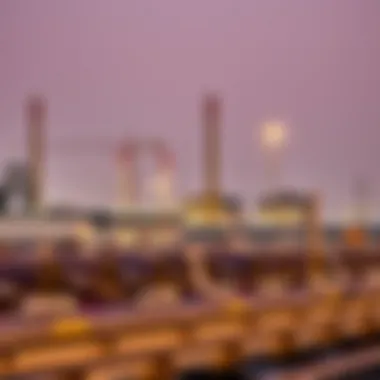
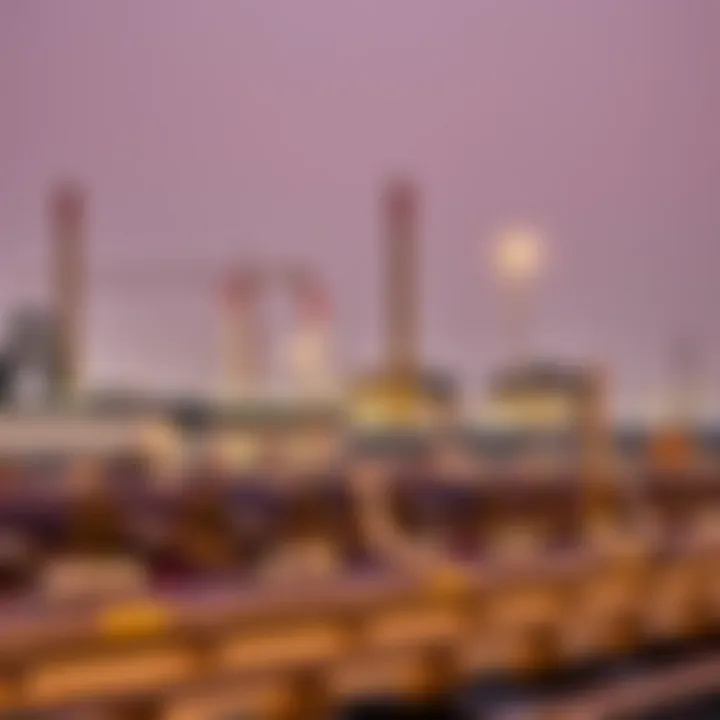
Tax Benefits
One of the standout features of establishing a business in Dubai’s industrial parks is the array of tax incentives available. Dubai’s tax regime is notably favorable. Businesses often enjoy zero corporate tax rates for a specific duration, which can stretch up to 50 years depending on the agreement. These incentives can translate into massive savings, allowing companies to allocate funds towards expansion and innovation. Moreover, there are no personal income taxes, which appeals to a diverse pool of skilled labor.
While these benefits are enticing, it’s essential for investors to stay updated about potential changes in regulations. As economic landscapes evolve, taxes on certain sectors might enter debate, so vigilance is key here.
Streamlined Licensing Processes
The process of securing a business license in Dubai has been designed with simplicity in mind. Authorities have made it a priority to streamline licensing procedures, reducing bureaucracy and enhancing efficiency. For example, the Dubai Economic Department and free zone authorities have established one-stop shops for business registrations. This effectively shortens the time it takes to get a license from days to mere hours in many cases.
Furthermore, some zones offer automated online platforms where entrepreneurs can submit documents electronically, enhancing accessibility. However, navigating through various regulations still requires diligence on the part of the investors, as different sectors may be governed by specific stipulations.
Support for SMEs
Small and medium enterprises (SMEs) are often regarded as the backbone of Dubai's economy. To bolster this sector, the government has rolled out various programs that cater specifically to the needs of SMEs. Financial assistance can come in the form of grants, and loans at reduced interest rates. Additionally, initiatives like the Khalifa Fund provide vital support to startups.
Moreover, many industrial parks house business incubators and accelerators aimed at fostering the growth of SMEs. These facilities offer mentorship and business services, helping new enterprises gain a foothold in the competitive market.
Investing in Dubai's industrial parks not only presents lucrative opportunities but also allows businesses to leverage strong governmental support and incentives, crucial for long-term success.
Investment Opportunities
The growth of industrial parks in Dubai presents a goldmine of investment opportunities. These zones serve not only as business hubs but also as a breeding ground for economic diversification. While many look to invest solely for profit, the broader context showcases how investments here align with Dubai's vision of fostering a dynamic and sustainable industrial environment.
Real Estate Investment
Real estate in Dubai's industrial landscape is about more than just brick and mortar. The demand for industrial properties is increasing, driven by factors like population growth and the diversification of industries. An investor must consider that the location of these parks, such as the Dubai Industrial City or the Jebel Ali Free Zone, provides strategic advantages including proximity to transportation links and market access.
- High Return on Investment: With the right property, investors can expect solid returns, often above the average market rate. Leasing out industrial units can result in a steady income stream.
- Modern Infrastructure: Many industrial parks are equipped with cutting-edge facilities. This infrastructure supports various industries, enhancing the attractiveness for tenants and investors alike.
- Long-term Growth Potential: As Dubai continues to evolve into a global business hub, the demand for industrial spaces is likely to increase, ensuring long-term property value appreciation.
"Investing in real estate within industrial parks offers not just immediate returns but also the possibility for future growth as more businesses flock to establish a presence in Dubai."
Joint Ventures
Entering into joint ventures in Dubai's industrial sector opens avenues for shared resources and reduced risk. Investors can collaborate with local firms for better insights into market dynamics while leveraging existing relationships with regulators and supply chains. This synergy can cultivate a competitive edge in a rapidly changing market.
- Shared Risks and Responsibilities: Partnering allows for a division of risk, so individual companies are not solely responsible for potential financial pitfalls.
- Access to Local Knowledge: Collaborating with established businesses can provide invaluable insights into the cultural and operational doing of Dubai. This is crucial for navigating regulatory frameworks effectively.
- Diverse Portfolio: By diversifying into different sectors through joint ventures, investors can spread their exposure while capitalizing on emerging trends.
Foreign Direct Investment
Foreign direct investment (FDI) is a significant driver of economic growth in Dubai, with the government actively encouraging foreign investors through various incentives. As a foreign investor, understanding these opportunities is crucial. The potential for high returns is often coupled with the need to navigate local regulations and market intricacies effectively.
- Government Incentives: Dubai’s free zones often offer tax exemptions and other financial benefits tailored for foreign investors looking to set up business operations.
- Expansive Market Reach: Entering the Dubai market provides access not only to local consumers but also to a wider Gulf Cooperation Council (GCC) market, increasing the scope of operations.
- Sustainability Goals: Many foreign investors are focusing on sustainable industrial practices. By investing in green technology sectors, companies can align with global trends while capitalizing on governmental support for eco-friendly initiatives.
For more on investing within Dubai's industrial context, check out Dubai Investments, Dubai Economic Department, and Gulf News.
Challenges and Considerations
Navigating the landscape of industrial parks in Dubai comes with its fair share of hurdles. Investment decisions hinge on a thorough understanding of these challenges, lest investors fall prey to pitfalls that could have been foreseen. This section addresses three key elements: market competition, regulatory changes, and environmental factors, providing insights that are invaluable for prospective stakeholders in Dubai's industrial sector.
Market Competition
The industrial sector in Dubai is a bustling arena, with players vying to carve out their own space. Understandably, newcomers might feel daunted by the sheer scale of competition. Gaining a competitive edge requires not just insight into existing players but also a finger on the pulse of market trends. Companies that fail to keep up could easily find themselves rendered obsolete.
To stand out, businesses can consider unique selling propositions (USPs) that align closely with the needs of their target demographics. For instance, a company specializing in sustainable manufacturing processes can attract environmentally conscious clients and partners. Investigating market niches and focusing on innovation are key strategies. According to a report by the Dubai Economy (www.dubaided.gov.ae), maintaining awareness of what competitors are doing can help businesses tailor their services accordingly. The factors influencing competition can include:
- Pricing strategies
- Quality of service
- Technological advancements
Regulatory Changes
With Dubai's rapid growth, regulatory frameworks often shift to accommodate new developments. Investors need to stay informed about these changes to avoid legal missteps that could derail operations. For instance, recent adjustments to licensing requirements can have a direct impact on operational timelines and costs.
Staying engaged with local government bodies is crucial, as they often provide resources and updates about impending changes. Furthermore, understanding the implications of international trade agreements becomes increasingly important as the world becomes more interconnected. Companies frequently must adapt their strategies to remain compliant and competitive.
"Regulations are not just hurdles to overcome but also gateways to new opportunities if approached correctly."
Environmental Factors
As environmental concerns continue to gain traction, the industrial sector is not immune. Operations in these parks must consider their carbon footprint and adhere to stringent sustainability guidelines to avoid penalties and negative public perception. Potential investors should be mindful of integrating environmentally friendly practices right from the design phase of their operations.
Also, understanding how climate factors could impact long-term viability is crucial. Water scarcity, desertification, and heat waves could pose challenges for companies reliant on specific resources. Integrating environmental considerations into business models might not just ensure compliance but can also lead to cost savings over time. Here are a few aspects to ponder:
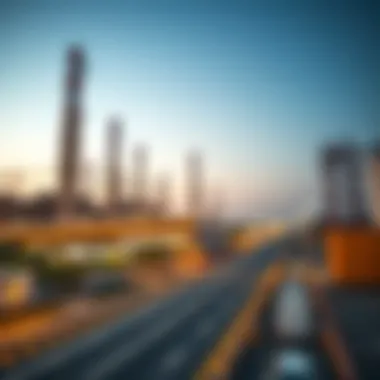
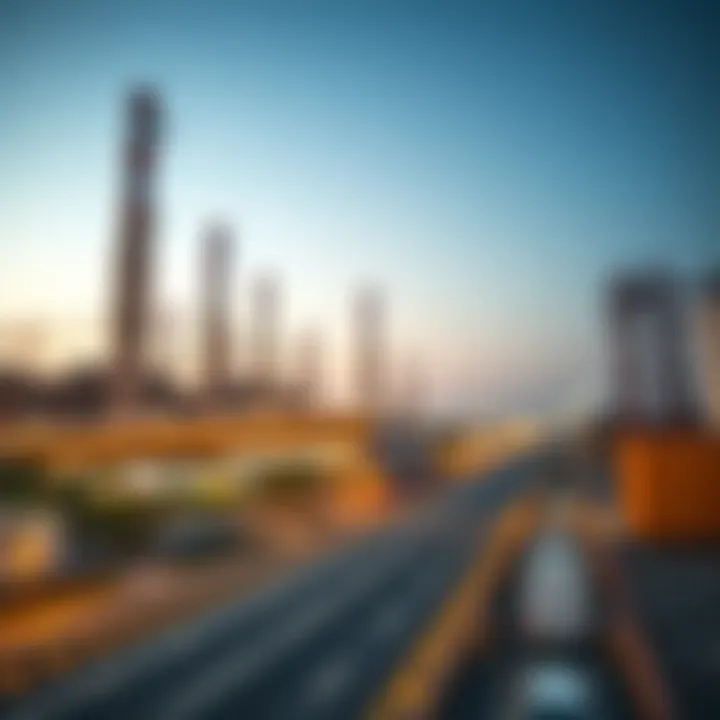
- Sustainable sourcing of materials
- Waste management practices
- Energy-efficient technologies
In summation, being aware of challenges like market competition, regulatory nuances, and environmental considerations can make or break an endeavor within Dubai's industrial parks. Investors and stakeholders who undertake this due diligence will find themselves better equipped to thrive in this dynamic market.
Case Studies
The analysis of case studies in the realm of industrial parks provides invaluable insights into their operational frameworks and successful integration into Dubai's dynamic economic landscape. This is not just about numbers or the growth of businesses; case studies tell the stories behind the operations in these parks, illustrating how varying elements come together to foster success. They present real-world applications of theories, which is essential for investors and stakeholders making informed decisions.
Successful Business Models
Looking at successful business models in Dubai's industrial parks reveals a tapestry of strategies that have borne fruit across different sectors. Companies in these areas have innovatively leveraged the advantages offered by their locations. For instance, in Dubai Industrial City, Coca-Cola has established one of the world's most advanced bottling plants, showcasing efficiency and state-of-the-art technology. This model highlights the importance of not only location but also operational excellence and adaptability.
On another front, Al-Futtaim Group has optimized its automotive assembly operations in Jebel Ali Free Zone, tying together logistics, manufacturing, and distribution seamlessly. Their integration of supply chains illustrates the critical role of cooperation among various industrial entities, thus boosting productivity.
It's crucial to evaluate such business models for their replicability. New investors can draw lessons from these experiences to tailor their approaches to leverage the unique benefits Dubai offers. Successful models can hence inspire confidence and provide blueprints, paving the way for new ventures.
Lessons Learned
Delving into lessons learned from these case studies provides further context. One notable takeaway is the necessity for agility in operations. Companies like Emirates Global Aluminium have adapted to fluctuations in both local and global demand, showcasing how maintaining flexibility is vital to thriving amid changing economic conditions.
Moreover, the integration of sustainable practices has emerged as a key lesson. As environmental regulations tighten globally, businesses in Dubai's industrial parks are increasingly implementing green technologies. This not only aligns with the Dubai government's vision for sustainability but also meets market demands for responsible production practices.
Understanding potential pitfalls is equally important. Observations from various case studies indicate that mismanagement of resources can lead to significant operational challenges. Investors and businesses need to earmark resources for continuous improvement and market research to stay competitive. Moreover, having proactive strategies to navigate regulatory changes can differentiate successful companies from those that struggle.
"Transforming challenges into opportunities is the hallmark of successful businesses in Dubai's industrial parks."
In summation, case studies within Dubai's industrial parks offer fertile ground for lessons in business development, sustainability, and operational strategies. By examining real examples, investors and entrepreneurs are equipped to map their unique paths in this vibrant ecosystem, positioning themselves for success in Dubai's competitive industrial landscape.
Future Trends
In the ever-evolving landscape of industrial parks in Dubai, understanding future trends is crucial. These trends shape not just the local economy but also how global business strategies adapt to the unique offerings of the region. Investors and stakeholders must stay attuned to these changes for successful engagement in this competitive environment.
Shifts in Industrial Focus
Over recent years, there’s been a noticeable shift in what industries populate Dubai’s industrial parks. Traditional sectors such as manufacturing and logistics continue to hold their ground, but they’re increasingly being complemented by emerging fields like biotechnology and renewable energy. This diversification is not mere happenstance; rather, it reflects a strategic pivot aligned with global market demands.
For instance, Dubai Industrial City has started to attract businesses in the food processing sector, while Jebel Ali Free Zone is now eyeing technology-driven startups. The goal? To create a balanced ecosystem that can withstand market fluctuations and offer sustainability in growth.
These shifts encourage investors to broaden their horizons and consider sectors they may have previously overlooked. The landscape is changing, and those who adapt will likely have an upper hand.
Sustainable Practices
Sustainable practices are becoming less of a trend and more of a necessity. With Dubai's ambitious goals for reducing carbon emissions, industrial parks play a pivotal role in this vision. Environmental regulations now dictate that businesses employ practices that minimize their carbon footprints. This is especially true for new developments in industrial parks.
Industries are increasingly turning to renewable energy sources, such as solar and wind, to power their operations. Investment in eco-friendly infrastructure is now seen as a wise choice, aligning with both government incentives and changing consumer preferences. On the ground, parks like Dubai Investment Park are leading the charge with green-building certifications and zero-waste initiatives.
"Integrating sustainable practices into business operations is no longer an ethical choice but a strategic necessity in Dubai's industrial landscape."
These shifts not only meet regulatory requirements but also enhance the overall brand reputation of the businesses involved, attracting conscientious consumers and partners alike.
Technological Advancements
Technological advancements are at the forefront of shaping the future of industrial parks in Dubai. With the Fourth Industrial Revolution pushing boundaries, automation, artificial intelligence, and smart manufacturing are beginning to take root. This transition offers tremendous opportunity for businesses looking to enhance their productivity and efficiency.
For example, the implementation of smart logistics systems is revolutionizing supply chains, leading to faster and more cost-effective operations. Moreover, collaboration spaces that cater to tech startups are emerging within these parks, making way for innovation hubs that drive new ideas.
As investors, it is paramount to keep track of these advancements. Partners who integrate cutting-edge technologies into their operations can optimize their processes and stay ahead of the competition. From sensor technologies that improve equipment maintenance to data analytics that enhance decision-making, the future is ripe with possibilities.
In summary, industrial parks in Dubai are entering a transformative phase where shifts in industry focus, sustainable practices, and technological advancements are changing the very fabric of their operations. For investors and stakeholders, now is the time to engage in these trends, capitalizing on the rich opportunities they present.
Networking Opportunities
Networking opportunities within industrial parks in Dubai play a pivotal role in fostering business growth and collaboration. These environments are not just centers for manufacturing or logistics; they serve as vibrant hubs where diverse industries intersect. Companies situated in industrial parks benefit from unique chances to forge connections, exchange ideas, and form strategic partnerships that can drive innovation and profitability.
Trade Shows and Expos
Trade shows and expos hold significant weight in the industrial ecosystem of Dubai. Regularly organized events showcase products and services while providing an arena for industry players to network. These venues are teeming with professionals eager to share insights, explore new technologies, and seek collaboration. For instance, events like the "Gulf Industry Fair" and "Arabplast" draw thousands of participants from various sectors, allowing attendees to witness the latest trends and innovations firsthand.
Moreover, exhibiting at these shows can enhance a company's visibility, placing it front and center in the eyes of potential clients and investors. Engaging with visitors at such platforms also allows businesses to gauge market reaction to their offerings, refining their approaches based on direct feedback. Consequently, these interactions can lead to fruitful partnerships or investment deals.
Industry Associations
Industry associations in Dubai present another layer of networking potential. These organizations are instrumental in promoting sectoral interests, providing resources, and facilitating discussions among stakeholders. For example, the "Dubai Chamber of Commerce" organizes various events and committees where members can network, share knowledge, and advocate for better business conditions.
Being part of such associations also comes with its perks; they often provide access to exclusive market reports, seminars, and workshops that can enhance knowledge sharing. Furthermore, these groups enable businesses to stay up to date on regulatory changes, industry standards, and emerging trends—all vital for making informed strategic decisions.
"Industry associations serve as a beacon, guiding businesses through the complexities of the marketplace and connecting them to valuable resources and contacts."
In summary, investing time in these networking opportunities can yield significant benefits for businesses in industrial parks. The relationships formed in such settings can open doors to new markets, facilitate collaborations, and ultimately drive growth in the competitive landscape of Dubai's industrial sector.











